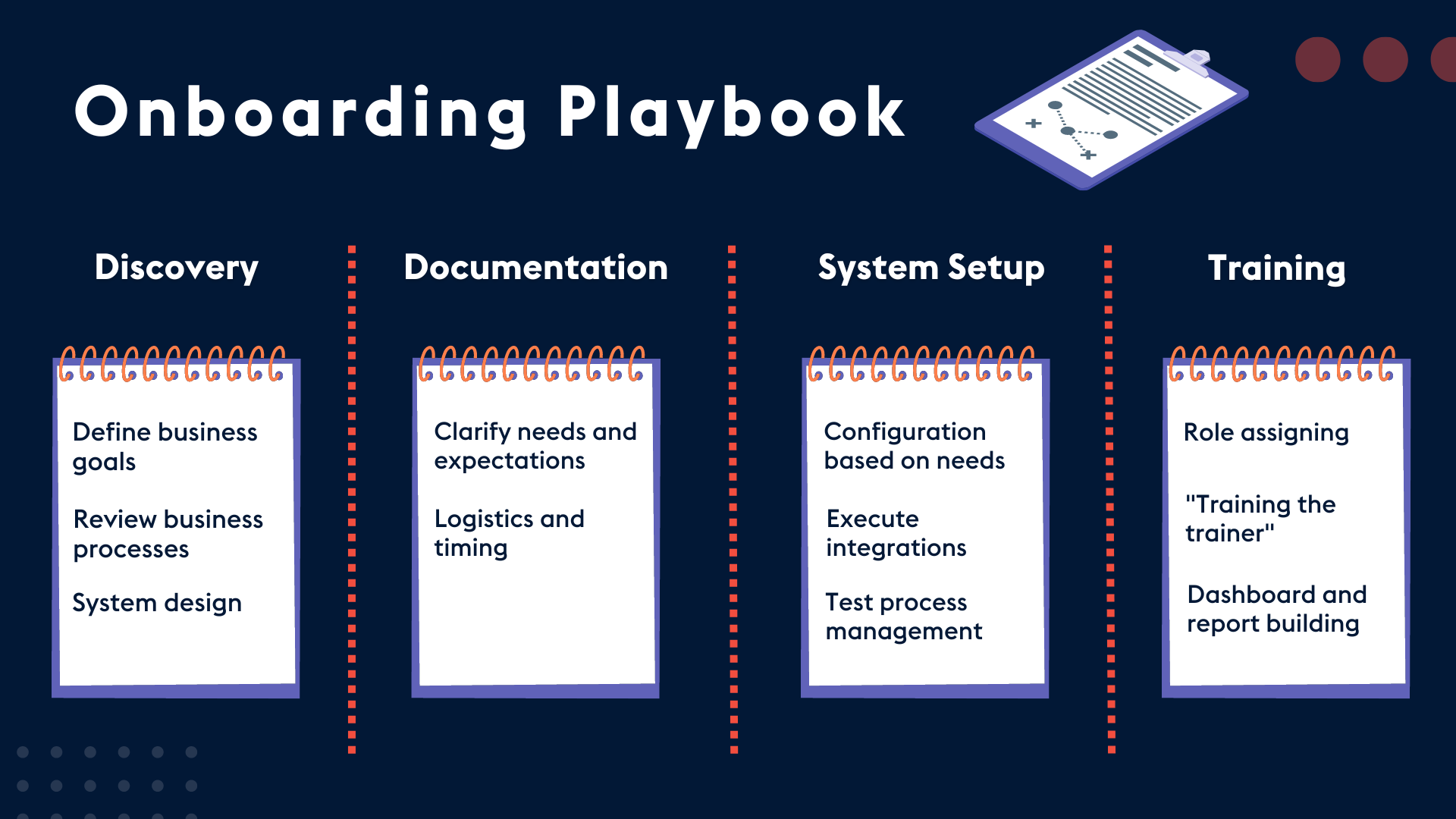
A CRM system is a significant investment. To ensure it delivers on its value and potential, it needs to be fine-tuned to fit your specific business needs. In addition, your people need to see and feel its benefits — sooner rather than later, ideally, to ensure uptake. This rings true whether you’re implementing a CRM for the first time, or you’re currently grappling with a CRM that just isn’t delivering as it should for your teams.
We’ve all been there: toiling away with software that isn’t quite fit for purpose or isn’t tailored to company needs. It can be a frustrating mess to deal with. Generally, these scenarios can be traced back to a lack of onboarding — maybe none at all, or perhaps an under-resourced go at it. The fact is that your CRM will only deliver insofar as your people are ready and willing to use it, so onboarding is everything. Here, we’ll dive into what onboarding is and involves from our Provident CRM standpoint, and the advantages it’ll offer your business on your CRM journey.
After you’ve selected your CRM solution, onboarding is the crucial link between purchase and successful roll-out in your company. As we’ll explore further below, it’s vital for your CRM to take root and blossom.
For the Provident team, this revolves around ensuring your CRM solves your issues, meets your needs and creates a springboard for further success. Paving your way to gaining maximum value from your CRM investment, both short-term and long-term.
I’ll walk you through the approach we take at Provident CRM:
We’ll gain information about a new client from our trusty sales team, which we use our discovery sessions to flesh out. This typically happens over one or two days, depending on the complexity of the project. Essentially, we’re looking to get to know your business, so that we can ensure your CRM software works as hard and well as it can for you, priming you to achieve your business goals.
The discovery session is generally quite intensive, meaning we often break it down into various sessions. It’s important to us that all your stakeholders have a seat at the table, from senior management to the end users in each of your teams. This ensures we can tailor your CRM system to meet all stakeholders’ needs, so they’ll see its benefit for them once they’re onboarded and using it day to day.
It also provides a key opportunity to share why your employees are going to be asked to begin using your new (or just improved!) CRM software. Crucially, top-down impositions rarely lead to widespread, long-term CRM adoption; platforming and responding to bottom-up voices and needs, however, does. Of course, there’s always a hurdle for employees to overcome in terms of getting to grips with new software, and figuring out how it can serve and facilitate their work. Guiding this process with quality onboarding, though, is what keeps this as a natural, temporary and jumpable hurdle, rather than morphing into resentment and rejection of a new CRM.
Typically, our discovery sessions are spread over three steps:
We explore the pains your business is experiencing that led it to seek out a CRM system, and what you’re trying to achieve overall. If you have an existing system, we look into why it’s not working as it should for you. If you don’t yet have a CRM in place, we explore your current tools (Excel, for example), and the headaches those are causing!
We utilise the discovery session step to meet all the stakeholders for your CRM project. From end users to middle management to executives, we want to understand pain points, needs, wants and aims. They’ll all have different objectives and uses for the CRM: recording contacts or deals daily, say, or analysis and forecasting by senior management. By bringing them all to the table, we can create foundations for tailoring your CRM to cross-company needs.

Here, we look into your as-is ways of working. What’s running smoothly, and what isn’t? Are your processes too complex? Are they efficient? Perhaps most importantly, do your people believe in the utility and purpose of what they’re doing in the business, day after day? To find our answers, we map your relevant business processes individually. From this understanding, we can effectively redesign as needed. Enhancing efficiency, cross-organisation collaboration and job satisfaction, too.
Take implementing HubSpot Sales Hub, for example. We’d break down your current process (lead capture, handover from marketing, and so on), mapping it thoroughly in a whiteboarding session with your key sales and marketing stakeholders. To get stuck into your processes, we often also mock them up in one of our CRM software demo environments. One of your sales team, for example, can then take us through the as-is process: from a lead to an opportunity, to a closed won deal or a closed loss deal. This clarifies who, what, when and why, and allows us to start pinpointing areas for enhancement, geared towards achieving your business goals.
Building on process mapping and highlighting changes to be made, we move into this final part of the discovery session. Here, we demonstrate how your new-and-improved processes will look, feel and function in your chosen CRM platform. This could range from simple menus to workflows to processes, depending on your particular scope. Overall, though, it’s about shaping in-platform designs to meet your users’ requirements, and checking they’ll serve your objectives.
Once we’ve agreed on our project plan and approach, we document in detail what’s going to happen and when. This clarifies timings, expectations and needs on both sides as, for successful CRM implementation, we need your team to work with us! Collaborating on continuing to guide us through current pain points and processes, fine-tuning how we shape your new CRM processes to achieve future business goals, and so on. The more complex the CRM project scope, the more extensive our documentation is at this step.
Any CRM you select will work out of the box. However, it won’t be configured to suit your business needs. To ensure this, we set up your instance: establishing users’ privileges, adding the right email accounts, executing any integrations with your existing software, customising your company’s contacts module and workflows, and so on.
Once we’ve built, we start to test internally. Continuing our HubSpot Sales Hub example, this would involve testing sales process management end-to-end, ensuring it aligns with the needs and aspirations we gathered from your stakeholders. Once approved on our end, we’ll invite your people to test, too, asking key stakeholders (CRM Champions, as we call them) that we’ve identified in discovery to log in and use the system as though on a normal day. This is their opportunity to flag any tweaks needed; moving a menu or adapting a layout for greater intuitiveness, say. It shows exactly how the CRM will work for them, and we can then go into depth to ensure the final version is ideally suited.
At Provident CRM, we believe in training the trainer. The CRM Champions that we find across your business are key to this! For a Sales Hub roll-out, we’d seek out the administrator, the manager, the expert on that particular part of your business process and system. Alongside training the rest of your team, we’ll then focus our knowledge-sharing on these CRM Champions. This training-the-trainer approach enables them to become experts within your business that your people can go to for additional guidance with your new CRM. Ensuring you can facilitate business-wide adoption via central, familiar faces, and continue your CRM momentum independently (with our Provident team always on hand, of course).
Again depending on project complexity, we tend to train your team over a day or two, with more training available if needed or requested. To ensure the training is as valuable and practical as possible, we’ll take your teams through the process of building the specific dashboards, reports, etc. that your business needs.
Once your CRM Champions and wider team are happy that your CRM is working as requested, we’ll introduce you to our Customer Success team. They’re your touchpoint going forward — ensuring your CRM evolves with your business and helping you to leverage its evolving features and benefits.
Fundamentally, you’re not stranded when it comes to ensuring your new CRM is tailored to your business needs and rolled out successfully! You have a team on hand ensuring you maximise return on your investment, and smoothing adoption across your company.
1. Shift onboarding off your internal teams’ plates
The bright idea to implement a CRM will likely have come from a go-getter in your company. Proposing and purchasing is one thing; ensuring success is quite another! We take customisation and onboarding off that go-getter’s plate, so they can focus on their primary role. Avoiding the CRM roll-out becoming a burden on them, rather than their shining initiative to evolve the business. Spotting and training your internal CRM Champions enables us to then smoothly hand over the reins.
2. Achieve ROI on your CRM as soon as possible
Well-crafted onboarding is essential for the adoption that will see your CRM implementation succeed. Here, timing is everything. If you roll out a CRM without expert onboarding, people will likely struggle. If they’re already encountering problems, you’ve got an awfully big mountain to climb to convince them the software and new way of working is, in fact, worth their time and effort. If you can onboard in parallel with roll-out or pre-plan it, however, everyone will know what’s happening before your CRM software hits the ground — creating a much easier job overall.
3. Ensure all stakeholders have a say
Given our external, objective perspective at Provident CRM, we’re ideally positioned to ensure all your stakeholders’ voices are heard. This paves the way to the understanding, customisation and enthusiasm around your CRM software that’s key to adoption. Our discovery sessions create a platform for all company levels to explain frictions, needs and goals, priming your CRM to serve these.
4. Fix your target issues (and avoid creating new ones!)
Without proper onboarding, a CRM can easily end up not being used at all or being used sub-optimally. This can rapidly generate (fresh) headaches:
Believe me when I say that we’ve seen it all at Provident — and we’re here to untangle the messiest of webs!
5. Leverage the right features within your CRM
Taking HubSpot as an example again, it’s an easy system to use but, by design, offers a vast range of features, technical elements and package levels. This primes it to serve multiple industries and verticals — but it will only work for you if you can pinpoint the aspects you need for your unique business aims. With an expert helping hand, you’d be able to leverage HubSpot’s potential for your company, most cost-effectively, and with the scope to evolve your CRM as needed.
It all comes down to ROI on your CRM investment, in terms of both making workflows work for you and ensuring your people recognise and feel its advantages as soon as possible. For success, we see onboarding that tailors your chosen platform to your business as a non-negotiable!
Working with our team at Provident means that all you need clarity on is what you want, not how to get there — we’ll gladly take care of that. We’ve worked with a vast range of businesses (sectors and sizes), gaining the experience and know-how to support you in achieving your specific CRM aims, now and in the future.
Provident are Platinum partners with HubSpot and monday.com and Elite Partners with SugarCRM, making us experts in the process of onboarding those solutions for successful user adoption through ongoing training, certifications, and optimisation services.